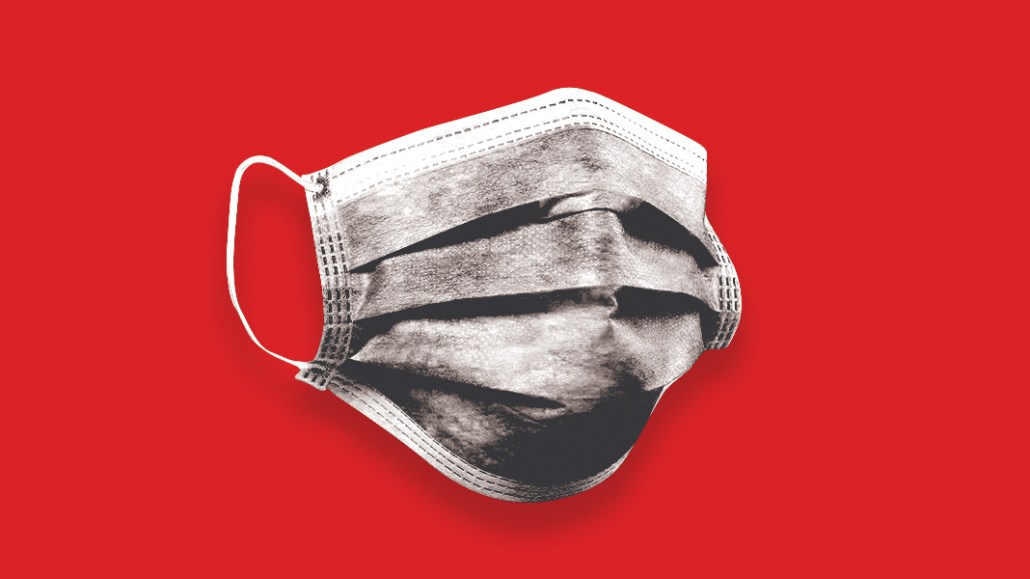Secure your place at the Digiday Media Buying Summit in Nashville, March 2-4
Publishers continue to see coronavirus coverage blocked by advertisers

Pressure is on from trade bodies, publishers and even brand safety vendors, but advertisers are mostly unmoved by arguments they should alter their keyword-based approaches to avoiding coronavirus news.
Publishers are crying foul and pointing to the frequency marketers talk about “purpose.” The message: If advertisers don’t rethink their ban on coronavirus news, credible journalism will not be sustainable at a time when it is needed more than ever. Integral Ad Science, a brand safety provider, released a study this week showing that people don’t think negatively about advertisers appearing near coronavirus news. And yet industry sources say they’re seeing just as much blocking as ever.
From March 16 to April 4, CPMs declined 34% for news sites, according to data tracked by media agency Goodway Group. There are early signs, however, that advertisers are buying more ads on news sites, albeit slowly. April spending on news sites rose 14% versus the first week of March, according to ad tech vendor PubMatic. Despite the increase, CPMs are still lower than normal due to the vast surplus of impressions.
“We can’t see increases in CPMs yet,” said the chief revenue officer at a pane-European publisher on condition of anonymity. “It’s hard to say if it’s because of brand safety of just simply lack of demand. I hope the latter, but I’m afraid brand safety is a big part of the declines as well.”
Most advertisers know that not all coronavirus news is bad, but they’re also not prepared to do anything that could jeopardize their business during a crisis. More often than not coronavirus news makes for grim reading and advertisers are notoriously sensitive to talking to people in those moments. Regardless of whether those readers actually make the link between bad news and bad companies, marketers believe they do.
“Historically, advertisers have a tendency to be very prudent with respect to associating their brands with news but that’s because they’ve been under pressure in recent years to be more accountable for where their ads appear online,” said Stephan Loerke, CEO of the World Federation of Advertisers. “There’s an opportunity for us to support our brand owners in becoming more granular about the choices they make about where their ads appear and are working on a tool that lets them make those choices using semantics, not just keyword targeting.”
Granted, there are some advertisers that have already changed their attitudes towards news in response to the pleas from publishers. Sales execs at Danish publisher JP/Politiken Hus see early signs of increased ad demand said head of product development and insights Thomas Lue Lytzen. “Some of them have started increasing their spend,” he added.
There’s a wealth of cheap inventory up for grabs for those advertisers focused to grow their share of voice in categories where their rivals are cutting it. Budget cuts, not brand safety, could be the real threat to news publishers.
“It is our assessment that the impact of keyword blocking is relatively marginal compared to the impact of the coronavirus on media spend,” said Loerke. “That’s our assessment based on conversations with our members as well as agencies.”
If the representative of the wider ad industry, then it would go some way to explaining why so many advertisers have steered clear of coronavirus news. Pulling ads from news sites in the name of brand safety could be an indirect but intentional way to keep media costs down, said Ratko Vidakovic, founder of ad tech consultancy AdProfs.
“Implementing stricter brand safety rules helps avoid some of the awkward conversations that happen when you cut advertising spend, said Vidakovic. “You can dance around the actual issue.”
According to a recent IAB study, more than a quarter of the 400 buy-side decision-makers surveyed said they plan to reduce the money used to buy ads on news publishers in the short-term. Conversely, just 18% of those surveyed said they planned to reduce spend on programmatic. In fact, 29% of the respondents said they will increase the amount of money they spend on programmatic ads.
“The data suggests ad spend is slowly starting to pick up but there’s a chance the allocation of where that money goes might change,” said Vidakovic.
More in Media

Media Briefing: Turning scraped content into paid assets — Amazon and Microsoft build AI marketplaces
Amazon plans an AI content marketplace to join Microsoft’s efforts and pay publishers — but it relies on AI com stop scraping for free.

Overheard at the Digiday AI Marketing Strategies event
Marketers, brands, and tech companies chat in-person at Digiday’s AI Marketing Strategies event about internal friction, how best to use AI tools, and more.

Digiday+ Research: Dow Jones, Business Insider and other publishers on AI-driven search
This report explores how publishers are navigating search as AI reshapes how people access information and how publishers monetize content.







